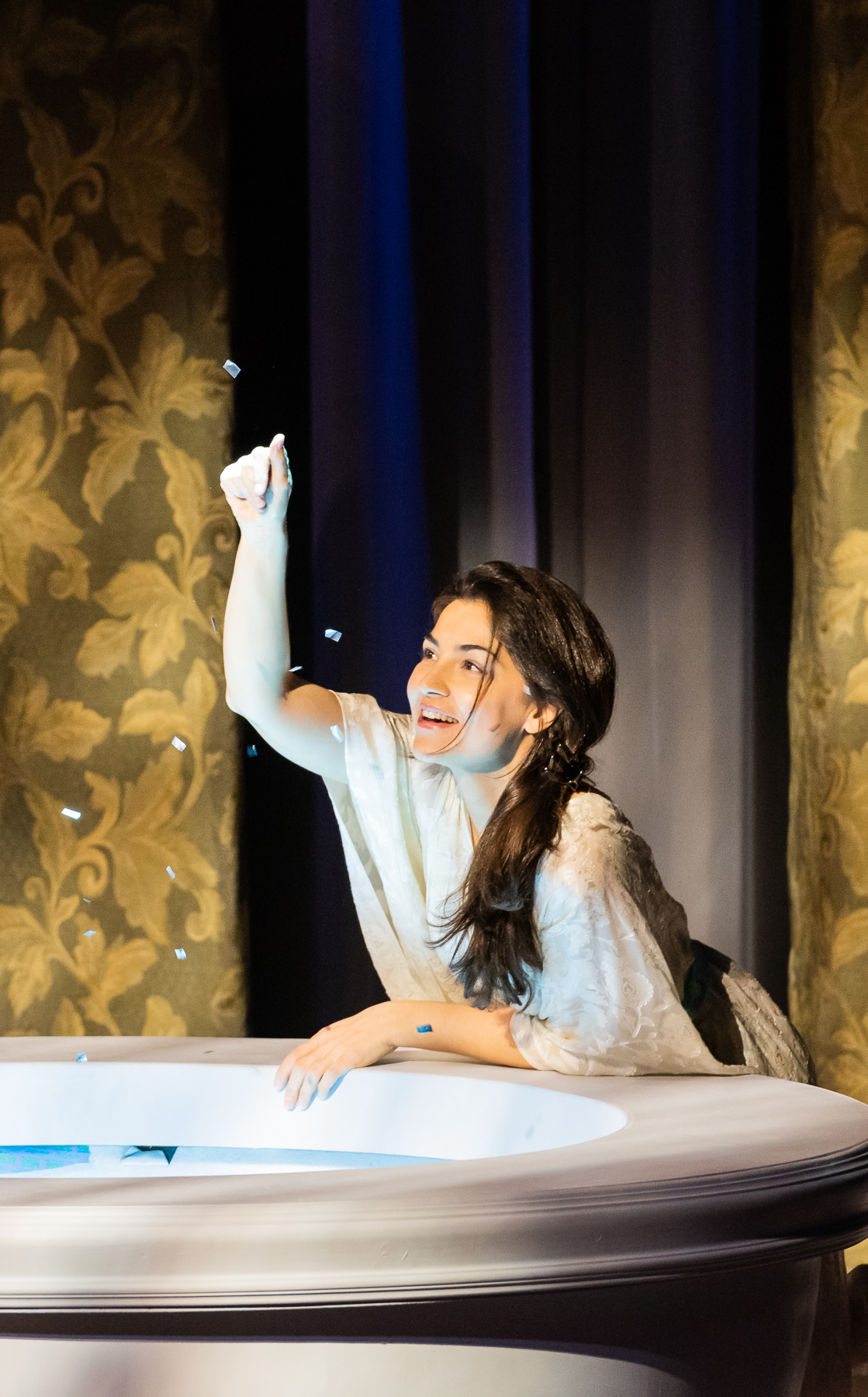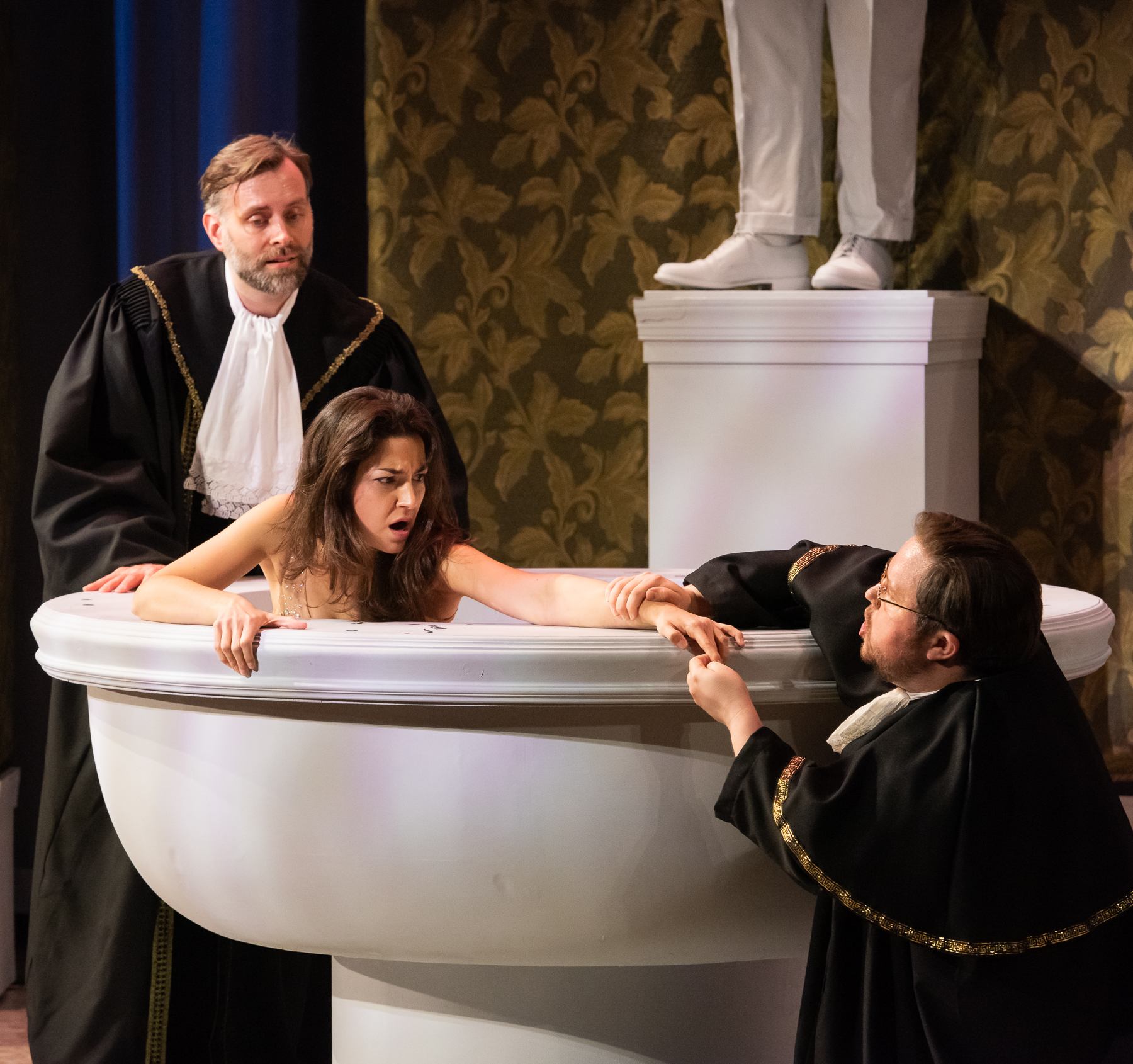With Opera Lafayette, it is never just an opera or a concert; it is always an extraordinary experience. Their collaborative effort with Heartbeat Opera to give us La Susanna is no exception. From beginning to end, I sat immersed in what was unfolding. It was old made new both by resurrecting a work from the 17th century by Opera Lafayette and by creation of a modernized framing of the story of Susanna and the Elders by Heartbeat Opera. It could have been a meeting of an irresistible force with an immovable object, HO’s penchant for updating classical works to better connect with audiences of today clashing with OL’s commitment to musical authenticity of works from the 17th and 18th centuries. It actually became a synergistic blending of cultures. Kudos to both for an outstanding collaboration.
Paul Max Tipton and Patrick Kilbride as the judges, Lucia Martín Cardòn as Susanna, and Sarah Couden as Testo. Photo by Louis Forget; courtesy of Opera Lafayette.
Susanna’s story derives from the 13th chapter of the Book of Daniel. Baroque composer Alessandro Stradella and librettist Giovanni Battista Giardini followed the biblical story closely in this work, written as an 1682 oratorio to be performed in concert; the story lends itself to staging, and it is also classified as an opera. Susanna is a victim of sexual coercion and retribution. Her crime was being the lust-object of two elders (judges) who spot this chaste, young married woman bathing alone. They approach her. When their attempts at coercing her to have sex with them are rebuffed, they turn vengeful, accusing her in public of adultery with another man and eventually sentencing her to death. She is saved from stoning by the young prophet Daniel whose questioning exposes the judges as liars. All is set right in the biblical tale, but not in this modern telling, though both end with her being set free. Many disturbing issues are exposed or in the terms of Director Ethan Head of Heartbeat Opera – problemalized with the casting of two male roles, Testo, the narrator, and Daniel, with women singers, forcing us to look at this story from a different, feminine perspective. In the pre-opera discussion with OL’s Artistic Director Ryan Brown, HO Director Ethan Heard, and HO dramaturg Peregrine Heard, one line of the libretto became a focal point; the judges sing “Great goodness and great beauty justify the desire to possess,” a societal theme that women through their sexual appeal are complicit in the sexual violence visited upon them. Thus, a tale written primarily to praise the righteousness of God is viewed through a #MeToo lense presenting a different view of society, past and present. Susanna was saved from death, but mankind was not changed.
Susanna (Lucia Martín Cartòn Martin) enjoying the privacy of her bath. The judges (Paul Max Tipton and Patrick Kilbride) pressure Susanna (Lucia Martín Cartón) to have sex with them. Photos by Louis Forget; courtesy of Opera Lafayette.
In this new production, contralto Sara Couden playing Testo, initiates the drama by announcing she is a professor of women’s studies who will be presenting a lecture on female empowerment. Her young female student, Daniel, played by Ariana Douglas, is seated by her side, recording notes. Her lecture is acted out by the three principals, tenor Patrick Kilbride and baritone Paul Max Tipton as the judges and soprano Lucia Martín Cartòn as Susanna. The intermittent movements of the actors lead to a series of still poses framing the recitatives and arias of each scene, pauses that both add emphasis and give time for the chamber ensemble to keep pace with an oratorio being performed as an opera. The poses are effective at portraying the depravity of the judges in the bathing scene as the judges take poses groping at Susanna. As Susanna is sentenced, Daniel rises up and can no longer endure the miscarriage of justice, the reality of the present breaking into the reality of the past, shattered by a woman’s rage (I was reminded of The Purple Rose of Cairo when Jeff Daniels steps out of the movie on a screen into the audience). Soprano Ariana Douglas was effective as an outraged Daniel, her vocals somewhat overshadowed by her emotion. The staging is largely a grouping of statues around a circular marble bath, that are symbolic and moved around for effect. For me, the least effective part of the staging was the prison scene; somehow, I lost emotional connection and was just an observer. Daniel’s outrage drew me back in.
Daniel (Ariana Douglas) comes to Susanna’s (Lucia Martín Cardón) defense. Photo by Louis Forget; courtesy of Opera Lafayette.
For me, the highlight of the opera are the vocals due both to the libretto’s insights and to the singing, especially the recitatives and arias by Lucia Martín Cartón as Susanna. The simple beauty of Ms. Cartón’s voice singing baroque arias is not to be missed. I hope she returns to the DC area in the future after having spent a few more years mastering her craft. With her voice, she has the potential to become a premier soloist. The libretto as well as the singing is notable in expressing the views of the different characters. Mr. McBride and Mr. Tipton have pleasant, strong voices and delivered their vocals effectively, revealing their character traits as well as the appeal of their voices and singing, some of which we as men must own and confront. Ms. Couden is also singled out for praise for her clear, expressive contralto voice. The music is supplied, as the original score requires, by two violins, a cello, a bass, a harpsichord, and a theorbo (sort of two lutes made into one stretching three times the size). The music was pleasant and an effective accompaniment for the drama for the most part, though my attention mainly was drawn to the vocals and the drama. At the very beginning, I found the violins to be a little shrill and a bit annoying; sorry but that was my honest response. One of the violinists was Ryan Brown, who is a master of this type of music; so maybe it was just a bit of undigested potato I was experiencing. I would have to listen more to the music to determine whether I think the music fits an opera of aspiration as adapted to this version of the story as well as one of inspiration for which it was written.
La Susanna’s cast and musician ensemble. Photo by Louis Forget; courtesy of Opera Lafayette.
Opera Lafayette/Heartbeat Opera’s La Susanna is the sort of arts experience that stays with you for a while, raising questions, provoking discussion. I think this is probably a case where doing the bathing scene as a nude scene would be justified to impart just how exposed and vulnerable Susanna was, similarly to Breaking the Waves. As done, her innocence and allure is conveyed, but also her power as though in a swimsuit competition. The funny thing is that I feel uncomfortable raising this issue because it increases the element of voyeurism (not to mention the logistical issues of finding a soprano willing). The performance led me to read chapter 13 of Daniel. I was struck by the fact that Susanna disappears from the biblical story when Daniel enters and the chapter’s last line proclaims: “From that day onwards, Daniel’s reputation stood high with the people.” It says nothing about Susanna’s reputation. Especially, her opinion of herself…and her changed view of the world in which she lived. As Susanna exited the stage at the end, I didn’t have the feeling she was the same anymore.
The timeliness of this ancient story hits you squarely in the face. Suppose for a moment that Susanna had had a chariot that could travel in time. I can imagine she would have made her escape, hopped into her chariot and headed to the future. Now, suppose she stopped by random chance in the present day. The first thing she sees when she bolts 2500 years into the future are news headlines about Harvey Weinstein. I like to think she would have jumped back into her chariot and headed even farther into the future, though I fear worse; she might have given up. What do you think she would have done?
The Fan Experience: La Susanna played on April 21 and 22 in the Terrace Theater of the Kennedy Center. Several of Opera Lafayette’s recent productions have been sell outs or close to. I hope the two performance format giving more fans a chance to see their productions will continue. As usual their production will move to New York, though this time in Brooklyn on May 2-5. Having attended Opera Lafayette productions for a couple of years now, I feel comfortable in saying that for an alive, pulsating opera experience, Opera Lafayette is the most reliable ticket in town.





